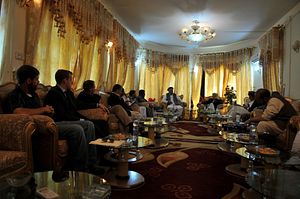Peace has always been elusive in Afghanistan. Several attempts have been made in the past to bring about peace and reconciliation in the war-torn country, but without success. A new round of the peace process has been started by the Quadrilateral Coordination Group, comprising representatives from Afghanistan, Pakistan, China, and the United States. They seek to find a way to engage the Taliban for sustainable peace talks.
Abdul Hakim Mujahid, a member of High Peace Council, a body of the Afghanistan Peace and Reintegration Program responsible for talks with the Taliban, spoke with The Diplomat‘s Sanjay Kumar about the latest peace initiative. Mujahid was the UN representative for the Taliban government in Afghanistan at the time of the September 11, 2001 attacks in the United States. Fifteen years ago he acted as an intermediary between the Taliban government and the United States, but now he is the voice of the Afghan government. He wants his former colleagues to join the mainstream in the country and to bring about healing after years of war.
The Diplomat: How do you see the new peace process?
Mujahid: It is a good initiative taken by four countries–Afghanistan, Pakistan, the United States, and China. They are very much involved in the affairs of the region and have stakes in maintaining peace. The United States and China can bring Pakistan and Afghanistan on board for a comprehensive peace process that can be lasting.
How realistic is the current process?
We are looking for a roadmap for peace, a framework for dialogue, and hope that these countries will have a plan to rope in the Taliban into the peace process that is needed to stabilize the region. Peace is not a mirage; it’s the wish of the people of Afghanistan.
The Taliban is a divided house today. How practical do you think it will be to bring all factions to the negotiating table?
First of all, we hope that all the factions of the Taliban will come under one leader. If this can’t be, we hope that the four countries will call all of them to the negotiations. They will try not to exclude anyone and to avoid the mistake that was committed in 2001, when the Taliban movement was excluded from the peace process. We have to learn from the failures of the past and understand why the earlier efforts could not yield any results.
Today’s Taliban is also a big headache for Pakistan, a country which is supposed to be friendly with the insurgent group.
The road map that the four countries are drawing is only for Afghanistan and not for any other country. The road map is being prepared to combat the Afghan insurgency and bring peace and reconciliation in Afghanistan. Certainly all four countries will cooperate with each other to combat the insurgency. They are working to protect each other’s mutual interest and to cooperate fully among themselves to make peace work.
Considering the mistrust between Pakistan and Afghanistan, how do you see the peace process moving forward?
The issue of mistrust is a problem that has been there right from the beginning. But by involving the two big international powers–the U.S. and China–it is hoped that we can create better understanding and trust between Islamabad and Kabul.For any peace process to make headway, a basic understanding between Afghanistan and Pakistan is a must.
What is China’s role in the peace process?
China is a rising economic power and they have a lot of investment in Afghanistan. It wants peace in the country for its own economic interests as well as for the overall prosperity of this region. Beijing has a huge stake in bringing normalcy to the region. It is also suffering from Islamic extremism and insurgency inside its own territory. It is important for China that groups like the Taliban, which act as an inspiration for China’s indigenous Islamic insurgency, are tamed and brought into the mainstream.
There are people in India who are questioning New Delhi’s exclusion from the negotiating table. Why is India not participating?
There is a no doubt that India is an important friend and a very active player in the region. New Delhi has been playing a positive role in the reconstruction of Afghanistan. The Indian government will appreciate the initiatives taken by the four countries in bringing the Taliban to the negotiating table and it understands that peace will not only help Afghanistan, but the whole region. Some of the important infrastructure projects in Afghanistan are being completed by India. New Delhi is deeply involved in the affairs of Afghanistan. It cannot be sidelined in any road map for peace in Afghanistan.
What is the time frame for the ongoing peace process?
These are the issues that remain in the hands of the four countries. I hope they will work out the road map and reach out to the Taliban. It is up to them how they would like to go about the peace process. So far, the Taliban has not said anything about the peace process. I am sure they also understand that the time has come for them to join the mainstream .
This interview has been edited and condensed for clarity.
































